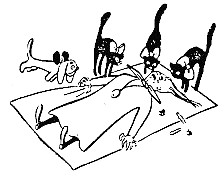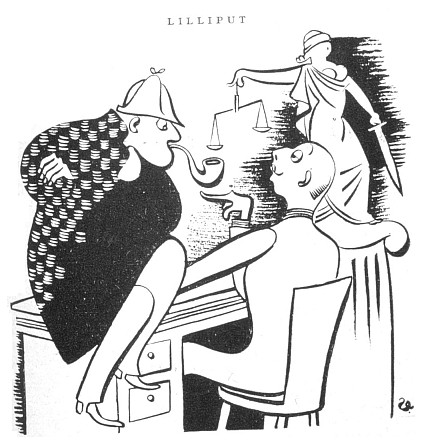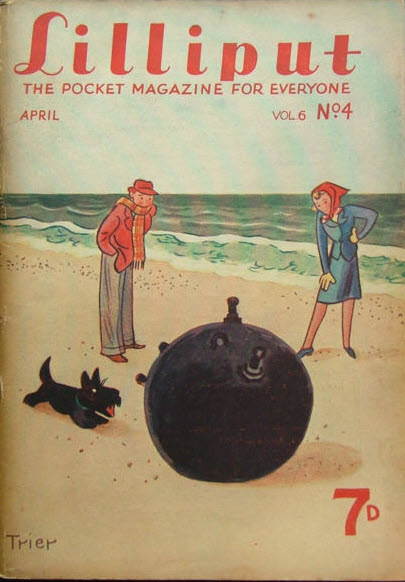By Frederick Karinthy
Criminal Investigation
HUMOUR

HE wore a chequered overcoat and a bright-coloured tie, and carried a walking-stick with a horn handle. So that but for the fact that I had sat with him at the café from three till five every day for four years, and knew that he was a plain clothes policeman, he would certainly have succeeded in taking me in. To the superficial observer he seemed to be a man who was pretending to be a simple country-man.
As he entered my room he greeted me gloomily:
“Good morning, mate.”
“Good morning, Mr. Paulton,” I replied. “But why do you call me mate? You always say, ‘Hello, old man’, at the café. Anyhow, how are you? How’s the wife? And how are the children? Any prospect of a rise?”
The detective gave me a troubled look.
“I beg your pardon,” he said, “I’m not a detective but an old gentleman from the country and I just happened to drop in to your
office for a little chat.”
“All right, Mr. Paulton,” I laughed. “Let’s not worry about it. Take a seat. Well, to what do I owe the pleasure?”
“Are you quite sure,” said the detective hesitantly, “that I’m Detective-Sergeant Paulton? I mean have you no doubt as to my identity?”
“Not the slightest! Why, you’ve got a pack of cards in your pocket that you borrowed half an hour ago from the waiter.”
He reached into his pocket, then: “You’re right,” he said solemnly. “Well, then, I admit I’m Detective-Sergeant Paulton.”
“Is that so? . . . Well, what brings you here?”
“I’m carrying on investigations,” he said, gazing at me darkly, “in the matter of the Curtis Street murder.”
“Very interesting,” I said. “I congratulate you. But what do you want from me?”
“From you? Nothing. I only came for a chat. A little talk, you know. A nice, friendly talk.”
LILLIPUT
“Really? And what do you want to talk about?”
“Well . . . let’s say . . .” began the detective slyly, “let’s say about the condition of crossing sweepers. I decided on that before I came up.”
“Well, fire ahead.”
“Were you thinking about the crossing sweepers between five and six p.m. yesterday afternoon?” asked the detective, fixing me with a keen look.
"I don't think so. Forgive me, I'm afraid it never entered my mind."
He looked at me triumphantly.
“So,” he said. “Then what were you thinking about?”
“Don’t remember.”
“Tut-tut,” said the detective. “Try to recall it. Weren’t you thinking about an old lady?”
“Humph. . . . What makes you ask that?”
“Very simple,” said the detective ironically. “Were you not, between five and six p.m. yesterday afternoon, were you not thinking about an old lady who was alone in her flat, and on whom you might call under some pretext or another?”
“Listen, Paulton,” I said reproachfully, “why can’t you be frank with an old friend?”
“What do you mean?”
“Why don’t you say straight
out that you suspect me of the murder of the old lady in Curtis Street?”
“Can’t be done,” said the detective severely. “If I did that you’d be on your guard, but so long as you don’t know it you might give yourself away.”
“All right,” I said. “Go on with your cross-examination.”
“You’re right,” he said with a grateful look. “I nearly forgot about that. Do you happen to know a question with which to start a cross-examination cleverly?”
“Of course I do. For instance, you ask me whether I’m a vegetarian.”
“Very good,” said the detective.
“Of course it’s good. But why do you take all this trouble? I can tell you straight away that I deny having murdered the old lady in Curtis Street.”
The detective reflected.
“I don’t like that,” he said at length. “The fact that you deny the murder makes you all the more suspect. You see, the question is, why do you deny the murder? And the answer: because you’ve committed it, and you’re afraid of the consequences. If you hadn’t committed the murder, you’d have no reason to deny it.”
“Listen, Paulton,” I said some-

what irritably, “why did you come to me? Have you got a clue?”
“A very interesting clue. There was a red handkerchief tied round the old lady’s throat. That was what she was strangled with. Well, I saw you—or rather I made the observation at the café that you were using a white handkerchief. I asked myself why? And I said to myself, because he left the red one at the old lady’s flat, so now he only has a white one. Well? What’ve you got to say to that? Can you prove that you have a red handkerchief?”
“No,” I admitted.
“Then you’re the murderer. You’ve no red handkerchief because it’s round the old lady’s throat.”
“Listen, Paulton,” I said, because I was badly in need of a nap, “have you got a red handkerchief?”
“No,” he said with a start.
“Then,” I said, “we’ve got another clue, and I call your attention to it. Maybe you’re the murderer.”
Paulton thanked me for the idea, promised to follow up the fresh clue, and went away.
